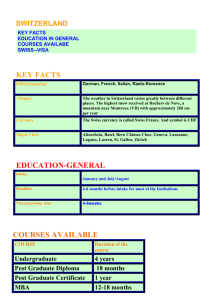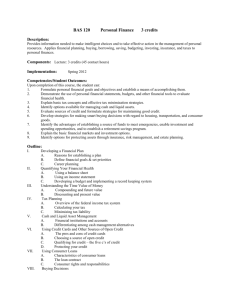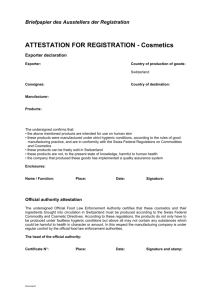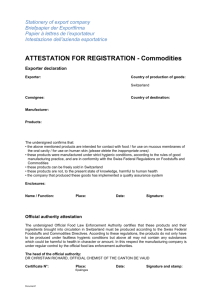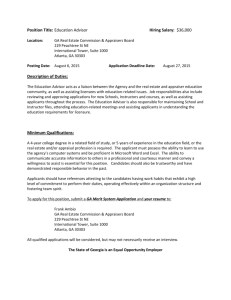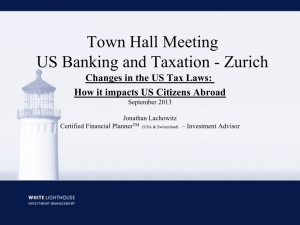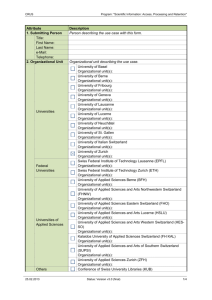Lachowitz Presentation - American Citizens Abroad Global Foundation
advertisement
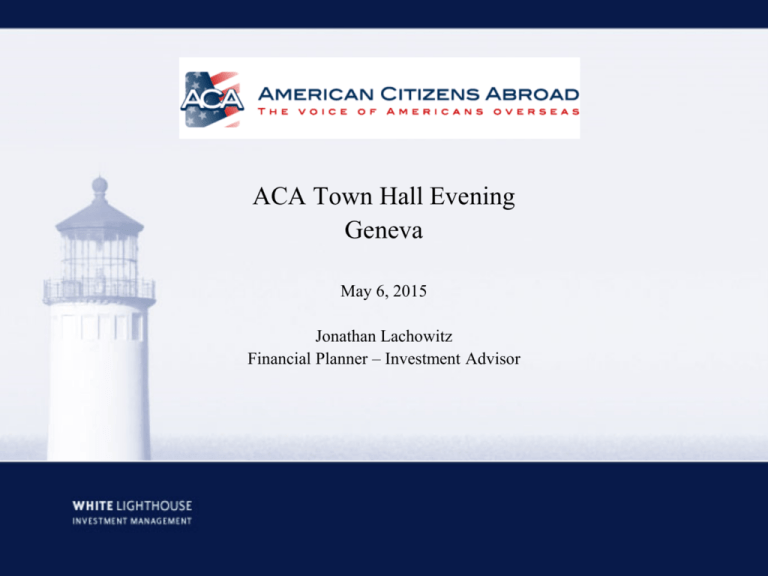
ACA Town Hall Evening Geneva May 6, 2015 Jonathan Lachowitz Financial Planner – Investment Advisor Introduction • • • • • Jonathan Lachowitz Board Member ACA Financial Planner & Investment Advisor Certified Financial PlannerTM – US & CH Founder of White Lighthouse IM in Lausanne & Lexington, MA • Writing on personal finance for Wall Street Journal - Expat Agenda & Additional Material 1. Choosing and Investment Advisor – Being a Smart Financial Consumer 2. Investment Management Decisions 3. Top ten personal financial challenges for Americans in Switzerland and how to address them. 4. Retirement planning for Americans in Switzerland - should I stay (in Switzerland) or should I go (back to the US). 5. 2015 Tax Change Summary 1. Being a Smart Financial Consumer 1. 2. 3. 4. 5. 6. Investment of your time – even if the subject is not interesting Together with your spouse or partner Educate yourself Hiring a professional(s) where specialists are needed You will need to pay for most good professional advice Being a good client – Most good advisors choose you as much as you choose them. Be respectful, honest, timely. 1. E.g. If you have had 5 new tax advisors in 5 years, the problem may not be the tax advisors 2. The Swiss Expat community is small 7. 8. 9. 10. Know your costs Know your rights and obligations Know what services you are looking for Comparison shopping Choosing a Financial Advisor – 1. 2. 3. 4. Do you need a financial advisor or planner? Why? What is a financial advisor? Different titles… Whose interests do they put first? Are they a fiduciary, employee, sales person? What are you looking for and what do you think you need? • • • 5. 6. 7. 8. 9. 10. 11. 12. A financial Plan? Investment Advice? Retirement advice? Get references from people you trust – Ask the one thing your reference does not like What Licenses, Education, Registrations do they hold? CFA, CFP®, CHFc or PFS (for CPAs) are some of the most respected. What Experience do they have? – Would you be a typical client? How does the advisor get paid? Is their advice objective? How do you know – Are they paid more to sell their company’s products? Can they choose any type of investment for your account? Will they consider or advise on assets not under their management? Ask them if they can beat the market? Have they or their firm been involved in any lawsuits consumer complaints or other disciplinary action? Choosing a Financial Advisor – 2 1. 2. 3. 4. 5. 6. 7. 8. What kind of firm do they work for? 1. Employee of a large firm 2. Employee of an Independent Advisory firm How was the first contact made: Did they call you first? Are the “selling” a tax efficient or Offshore product? Where are your assets held in Custody? Who has the ability to remove assets from your account? What is the firm’s cybersecurity policy? Would you be a typical client of the firm? Try this Quiz at the Wall Street Journal: http://blogs.wsj.com/expat/2015/05/03/attention-u-s-expats-take-this-quiz-and-seehow-your-financial-adviser-scores/ Recommended questions for your Financial Advisor 1. 2. 3. 4. 5. 6. 7. 8. 9. 10. What was your largest mistake in the past 10 years? – What did you learn from it? Do your financial incentives always line up with my best interests? How do you manage conflicts between your goals as an employee and what is best for your clients? Would you change your strategy for managing my account based on changes in the macro-economy? Who in your firm actually makes the decisions on my account? How have your clients’ portfolios performed over the past ten years? If I wanted to buy a couple of broad based (lost cost) index funds or ETFs, which would you recommend? May I speak with one of your former clients? If you ask for a referral is more than one choice presented? And/Or an explanation of why a specific client name is given? When was your last job change, and why? Questions for your Financial Advisor – continued - Do your research 11. Tell me about some of the outside professionals you work with: Do you pay or get paid for referrals? Do you disclose this to clients? 12. Ask about their regulators, auditors (when needed) 13. Is your advisor required to have continuing education? 14. Ask about Errors and Omissions Insurance 15. Where you could file a complaint if you could not resolve your differences with your advisor? 16. Is there any after sales “service”? In what way? Evaluating an SEC Registered Firm 1. For US Registered Advisors i. Very easy for a company to Register with the SEC – It is all about disclosure Individual has to pass the Series 65 Exam (relatively easy 3 hour exam requiring 72% correct) Investment Advisor Search http://www.adviserinfo.sec.gov/IAPD/Content/Search/iapd_Search.aspx ii. iii. i. iv. 2. Check out the firm and the individuals They should offer a copy of their ADV 2 (Firm and Individual) To verify CFP® certification - http://www.cfp.net/ (not required for SEC Registration) 2. Investment Management Decisions • Investing versus Savings • Risk versus Return • 3 Ways To Manage Money – Market Timing – Security Selection – Asset Allocation (Passive) Investment Management & Wealth Building Essentials • Asset Allocation – Primary Driver of Returns • Diversification is Critical – Only way to increase expected returns with out increasing risk • Only take stock market risk over long horizons • Dollar Cost Averaging • Save Regularly • Keep costs low Investment Management Considerations • Use Low Cost Index – ETFs – not leveraged – Diversified, Tax Efficient, Highly liquid, Low Cost • Avoid PFICs –(non US based funds) • Consider US Custody – Price, Execution, • Understand your “Real” Currency exposure – The SMI is primarily a US Dollar Stock Index of companies with a significant presences in Switzerland • Retirement Savings does not have to be in a “Retirement account” – After tax is often better • Don’t make moves that are tax efficient in one country only when subject to two country’s tax laws 3. Top ten personal financial challenges for Americans in Switzerland and how to address them. 1. 2. 3. 4. 5. 6. 7. US Tax Compliance – Keeping up with ever more complex rules US Tax Planning – Using the rules in your favor Saving for Retirement Estate Planning Insurance – Especially Life Insurance Investment Management Services Finding Professional & Trustworthy Services – Also at a reasonable Price 8. Managing Currency Risk 9. Real Estate 10. Feeling Powerless to “Change the System” to be more fair Top ten personal financial challenges for Americans in Switzerland and how to address them. 1. US Tax Compliance – Keeping up with ever more complex rules 1. 2. 3. 4. 5. 2. File your tax returns including worldwide income, pay your taxes on time and file your FBAR / FINCEN 114 and you will avoid 90% of “problems” that overseas Americans run into Next page has some of the most common overseas tax forms Employer and Employee contributions to retirement accounts are taxable in the US (flaw in the treaty) – track your US tax basis. Owning non US investment funds is for most US tax payers a recipe for trouble (especially without a tax advisor and even in 3rd pillar accounts). Even the most “simple” situation can be challenging to report properly. US Tax Planning – Using the rules in your favor 1. 2. 3. 4. If you have earned income and it is not all excluded, you can make a tax deductible IRA contribution Having a year with no income or low income for the US, consider a Roth conversion of US retirement accounts. Watch how your investments are structured: ETFs often better than similar Mutual Funds due to less capital gains distributions. Consider gifting and/or titling of accounts especially if married to non-citizen spouse. Summary for Foreign Information on “common” US Tax Forms 1. 2. 3. 4. 5. 6. 7. 8. 9. 10. 11. 12. 13. Form 2555 – Foreign Earned Income, generally due April 15 for US citizens and resident aliens living abroad to exclude a certain amount of foreign earnings from taxes and/or to claim the housing exclusion. Form 1116 – Foreign Tax Credit Form 8938 – New form to be included with tax return for individuals with foreign assets over $50,000 [higher limits for overseas residents] Form TD F 90-22.1 NEW FINCEN 114– Report of Foreign Bank and Financial Accounts, filed by June 30 of each year if at any time during the previous year the aggregate value of the taxpayer's foreign accounts exceeded $10,000 "IRS Releases Revised Foreign Bank Account Reporting Form"); Form 5471– Information Return of US Persons with Respect to Certain Foreign Corporations, attached to and filed with the taxpayer's income tax return; Form 8621 – Return by a Shareholder of a Passive Foreign Investment Company or Qualified Electing Fund, Applies to most foreign mutual funds, one form per fund is required and filed with the taxpayer's income tax return; Form 8858 – Information Return of US Persons with Respect to Foreign Disregarded Entities, filed with the taxpayer's income tax return. Form 3520 – Annual Return to Report Transactions with Foreign Trusts and Receipt of Certain Foreign Gifts, due on the date that the taxpayer's individual income tax return is due (generally April 15), including extensions; Form 3520-A – Annual Information Return of Foreign Trust with a US Owner, generally due March 15; Form 8865 – Return of US Persons with Respect to Certain Foreign Partnerships, attached to and filed with the taxpayer's income tax return; Form 926 - Return by a US Transferor of Property to a Foreign Corporation, filed with the taxpayer's income return Form 8833 – Disclosure of Treat Based Position Form 8832 – Entity Classification Election, often filed for a foreign company to elect disregarded entity status; thus, the tax responsibility flows through to the owner so that there is no tax at the company level; Top ten personal financial challenges for Americans in Switzerland and how to address them. 3. Saving for Retirement 1. 2. 3. 4. 5. 6. 7. 4. By far the most important thing is to save, regularly, this will have the biggest impact on your retirement. Retirement Savings DO NOT HAVE TO BE IN A “RETIREMENT” ACCOUNT Don’t “save” on Swiss taxes only to increase your US taxes TRACK YOUR US TAX BASIS in your 2nd and 3rd Pillars to help avoid double taxation in retirement. Retirement savings in a non tax-deferred account has other tax and non-tax advantages: Capital gains treatment is better, diversification and personalization of strategy is possible. Whether in Switzerland or the US, you will probably live longer than you think (on average); and Switzerland still has a mandatory retirement age for most jobs. You may need to be saving more than you think. Understanding of how US Social Security and Swiss AVS rules can work for or against you; especially with the deferral of benefits. Estate Planning 1. 2. 3. 4. Your US Will may not be executed the way you are expecting if you die in Switzerland. If you are not Swiss you can elect to have your home country law apply. A Swiss Notary or Attorney can help you get your paperwork in order. Switzerland has forced heirship rules, which means your children will inherit some of the estate upon the death of the first parent…unless you choose items 2 and 3 above. Top ten personal financial challenges for Americans in Switzerland and how to address them. 5. Insurance – Especially Life Insurance 1. 2. 3. 4. 5. 6. Life Insurance is most valuable in the currency it would be needed US tax payers should try to avoid building cash values or investing in non-US compliant Life Insurance Consider having a spouse own the policy for US estate planning purposes Medical Insurance is private in retirement in Switzerland; Medicare with supplemental insurance can be a reasonable alternative, but not available outside the US Term Insurance is generally far cheaper in the US but most US companies can not sell insurance to Swiss residents. Investment Management Services 1. 2. 3. Difficult (not impossible) to find comprehensive advice for US persons at a reasonable price if Swiss domicile of account is preferred. Strongly consider using a US investment account: Prices tend to be far more competitive; you can own most Swiss investments in a US based account. Being SEC registered does not mean a firm has any particular competence in working with US persons. Do your homework and be clear about what type of advisor you are looking for. Many (in the US and Switzerland) are strictly sales people with a fancy title. Top ten personal financial challenges for Americans in Switzerland and how to address them. 7. Finding Professional & Trustworthy Services – Also at a reasonable Price 1. 2. 3. 4. 8. If your bank / banker has asked you to leave because you are a US person, use this as an opportunity to go through a good selection process. Far too many people research a new restaurant more than they do their advisors. Get references, and follow through. The community of professional advisors who serve US persons (tax, legal, financial etc.) is small. Sometimes going outside the country can help. Most good advisors don’t need to advertise and don’t need to look for new clients; they can also afford to reject new clients who are not good for their business. Managing Currency Risk 1. 2. 3. 4. Holding cash in one currency that will need to be spent in another currency is risky (exchange rates). Holding cash for “long term” investment in the currency it will be spent is risky (inflation). Global stocks, including a large part of the SMI are highly correlated to the US Dollar, not the Swiss Franc. Nestle, Novartis and Roche – Buying shares in a company that are denominated in Swiss Francs are not much “safer” than holding stocks in dollars or euros. Holding dollars for the last 40 years you saw the dollar go from buying 4 Swiss Francs to buying less than 1 Swiss Franc. Holding shares in the S&P 500 saw an annual return, in Swiss Francs of close to 10% Top ten personal financial challenges for Americans in Switzerland and how to address them. 9. Real Estate 1. 2. 3. 10. Make sure you understand the income tax implications in the US of your Swiss real estate in terms of: Mortgage interest deduction, the sale of your home (capital gains or losses) and the paying off of your mortgage (capital gains and losses). This is a big shock to lots of US persons, see your tax advisor for good advice. The main reasons people make money in real estate is leverage and forced savings (to pay down a mortgage) over a long period of time. Luck helps. The main reasons people lose money in real estate is leverage, unfortunate timing and too short a time horizon. Feeling Powerless to “Change the System” to be more fair 1. 2. 3. 4. 5. Join ACA (or better, volunteer for ACA) and encourage your friends to join too. A very small organization with very little funding but lots of passion has a voice in Washington and in the US press; and it is increasing. Vote in Federal Elections & Contact your Representatives in Congress. Contact the US Embassy Talk to the Press. Nothing will change in Washington D.C. without individual citizens working for change. Saving for College Education • Saving in a 529 is still possible when living overseas • 529 funds can be used in hundreds of overseas Universities • Can be used as an estate planning tool 4. Retirement planning for Americans in Switzerland - should I stay (in Switzerland) or should I go (back to the US or elsewhere). 1. Often a lifestyle not a financial decision 2. Crossing borders presents threats and opportunities 3. Cost of Living: Matching Income to expenses currency 4. Tax System 5. Health Benefits 6. Language 5. What’s new for US Taxes in 2015 • Gift and Estate Tax Limits • Tax Summary Pages 1-6 2015 Gift & Estate Limitations • Annual gift exclusion amount at $14,000 for 2015 • Federal Estate Tax (Lifetime Gift Exclusion amount) $5.43 Million and Indexed annually for inflation • 2015 Gift exclusion amount to non-citizen spouse increases to $147,000 (up from $145k in 2014) • Federal Estate tax is not scheduled to sunset though the President has already proposed reducing it Congress has proposed repealing it 2015 Tax Summary – what’s new • FEIE $100,800 in 2015 up from $99,200 in 2014 • Top US Federal tax rate 39.6% for income $464,850 and up (Married Filing jointly, $439k HOH, $413k Single, $232k for Married Filing Separately) • US Long Term Capital Gains Top rate: 20% [0% or 15% may apply] • Medicare Surcharge (Obamacare tax) 3.8%: for joint filers >$250k, individuals >$200k • Itemized Deductions & Personal Exemptions phase out for Individuals earning > $258k and Couples >$310k. $284k for HOH and $156k for MFS. • AMT has been “permanently” inflation adjusted 2015 Tax Summary – Page 2 • Personal Exemption is $4000, but starts to phase out at $310k, completely phased out for income above $432k (both limits for MFJ, less for individuals) • Kiddie Tax – Children can ear $1050 with no taxes, up to $2100 at reduced rate and over $2100 at parents rates. • $5500 IRA contribution limit (traditional IRA) $6500 if over 50 years old. • Federal Gift tax exclusion $14,000 • Federal Estate tax exclusion (for US persons) $5,430,000 – Only $60,000 for non US persons holding US situs assets – Federal Estate tax rate 40% 2015 Tax Summary – Page 3 Obamacare • Net Investment Income Tax: 3.8% on the lesser of – – – • • • Your net investment income The amount of your modified adjusted gross income (basically, your adjusted gross income increased by an amount associated with any foreign earned income exclusion) that exceeds $200,000 ($250,000 if married filing a joint federal income tax return, $125,000 if married filing a separate return) [Effective start year 2013 tax year and does apply to foreign income] For 2015 tax returns, if you are a high-income wage earner [over $250k MFJ] with a W-2 [and self employment income] at the end of the year, you will have a .9 % ‘Additional Medicare Tax (AdMT) on income over $200k. This will be reported on new IRS Form 8959. [Effective 2013 tax year and does not apply to foreign income ] and will not be matched by employers. No Mandatory Health Insurance if you live outside the US for the entire year [Some content on this slide and next 3 slides from Larry Lipsher, US Tax professional based in Asia and fellow ACA member and PTAC professional] 2015 Tax Summary – Page 4 FBAR • • • • Fincen 114 (previously known as the FBAR) can only be e-filed – on the FINANCIAL CRIMES ENFORCEMENT NETWORK LINK: http://bsaefiling.fincen.treas.gov/NoRegFBARFiler.html The old FBAR form TD F90-22.1 has been replaced by the FinCEN 114. The TD F form had 3 pages of instructions. The FinCEN 114 has 19 pages of instructions. If a ‘third party’ (i.e. tax preparer) will be efiling for you, you must present a signed FinCEN 114 A to that preparer 2015 Tax Summary – Page 5 – Form 8938 • • • • • • Specified foreign financial assets must be reported on this form. There are filing level ‘differentials’ with lower amounts for US domiciled filers and expat filers: MFJ overseas: $US400,000 balance for all specified foreign financial assets as of 31 Dec 13 or balances on any day during the year that value was $US600,000 MFS or Single overseas: $US200,000 at 31 Dec or $US300,000 as highest aggregate amount during the year The 2012 Form 8938 was 2 pages. The 2015 version and beyond is 3 full pages There is a 12 page set of instructions, with examples, explaining what is considered a specified foreign financial asset. IRS Comparison of what needs to filed on the 8938 versus the FINCEN 114 (FBAR): http://www.irs.gov/Businesses/Comparison-of-Form-8938-and-FBARRequirements 2015 Tax Summary – Page 6 – Passive Foreign Investment Companies – PFICs – NON US Investment Funds • • • • • Form 8621 –filed if the taxpayer is a ‘Shareholder of a Passive Foreign Investment Company (PFIC) or a Qualified Electing Fund’. Most foreign mutual funds are PFICs The filing requirement applies no matter how small the investment if there is a distribution (dividend), disposition (sale) of shares, or a special election (QEF or MTM) is made Reporting requirements may apply, with limited exceptions, even if there is no income to report and no special election needs to be made The IRS estimates that it takes a PFIC owner 16 hours, 44 minutes for annual record keeping, 9 hours, 56 minutes for learning about this form and 14 hours, 14 minutes for form preparation and filing per form……..and a SEPARATE form is required for EACH PFIC! PFIC Taxation – – • Unless a special election is made, PFICs are taxed by default under the punitive Excess Distribution rules: income is ratably allocated to each day of the holding period of the investment, it is taxed at a the highest marginal tax rate applicable each year plus an additional interest charge is added, resulting in very high effective tax rates Timely made Qualified Electing Fund and Mark to Market elections can result in more favorable taxation, but these elections are available under limited conditions that may not be applicable to every investment. Message – It is not worth owning PFICs for 99.99% of Americans overseas – If you already own them; selling often makes sense though you should review the consequences Concluding thoughts • Time and Education are your best assets • Are you passionate about what you are doing ? If not, what are you doing about it? • Are you saving enough? Save Early and Often – Time Value of Money is a Miracle • Are your expectations realistic? • Remember Risk vs Reward – There is no such thing as a free lunch • Keep Fees and Expenses Low – But not too low • Find Professional Help When you Need it -Hire people who are more qualified than you: A financial planner can help you stick to your plan! Understand the real difference between Gambling and Investing • • Don’t expect Government, Company, Family or Children to take care of you: If they do, that’s a bonus. You are in the driver’s seat. • Don’t look at your portfolio too often • Things change, be prepared! Questions after the presentation? • E-Mail: info@white-lighthouse.com • Web Site www.white-lighthouse.com • Office Phone: 022 548 1431 Back up Slides 1. Tips for American Expatriates 1. Get a regular copy of your free annual credit report. +1 877 322 8228 2. Consider Implementing a security freeze to prevent id theft: http://redtape.msnbc.com/2007/11/now-a-way-to-st.html#posts 3. Get a regular copy of your US Social Security Statement: http://www.ssa.gov/ 4. File your Annual US Tax Returns – It is now being checked upon passport renewal! 5. Keep a US Credit Card, with a US address 6. Keep a US Address (For investing, credit cards & possible insurance.) 7. Get a US phone number (Skype, call 800 number for free) 8. Review Life Insurance and Long-Term Care Insurance in the US 9. Review a US based Will 10. Investigate what happens if you were to die while living overseas. (Swiss Law different than US) 11. If you plan to return to the US, work with advisors who are experienced with the US “system”: Financial, Tax, Legal etc. 12. Travel to the US only on your US passport 13. Vote in Presidential Elections (Federal ok, local elections not advised from overseas) 14. Check out previous residence: “Unclaimed Property” 15. If you are married to a non American, make sure you know the estate planning and gift tax implications! There are advantages and disadvantages… How risky is cash in the bank? Is your “guaranteed” money really safe in the bank? $100 Principle x 4% Interest $104.00 EOY $4 Earned Interest 35% Marginal Tax Rate $1.40 Lost to Taxes $102.6 After Tax Value 3.5% Inflation $3.59 Lost to Inflation $104.00 Nominal End of Year Balance - $1.40 Taxes Due - $3.59 Inflation $99.01 Real Value at the End of the Year Conclusion: Real loss of 1% in first year Over 9.5% loss in ten years and 30% in 35 years! You pay for certainty: no risk = no real return • • • Tips for Parents Kids see and emulate more than we are aware of: Are your money actions in-line with the values you would like to teach? Don’t tie allowance to household chores Give responsibility early: – – – – • • • • • • • Allowance: Save, Spend, Invest, Charity Bank accounts Credit card (for convenience) Employment Encourage & support: savings, investing, charity and spending Financial training does not end when the kids leave home… Use the right language: Don’t say “we can’t afford it” Include children in money discussions: Ensure they know how much things cost. Be open with your spouse Emphasize doing your best rather than being the best Don’t argue regularly about money in front of your children
